The Lord of the Rings: The Return of the King
Elvish has left the building.
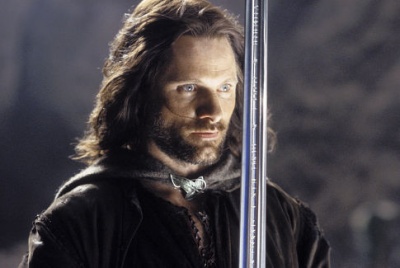
Alas, this film is not, as many rock 'n' roll fans had hoped, a documentary on Elvis' journey home from whichever planet he's been living on since the aliens took him away in 1977, but the final chapter in probably the best, and certainly the most ambitious, movie trilogy in cinema's 100 year history. There can be few people now unfamiliar with the name Peter Jackson, and most of those who have seen his previous chapters of JRR Tolkien's most famous work, The Fellowship of the Ring and The Two Towers, would agree that they demonstrate film-making ability par excellence, something all too rare in the field of big-budget blockbusters. In making these movies, Jackson has thrown down the gauntlet, and it may be some time until anyone comes along to challenge him.
The Fellowship of the Ring and The Two Towers have been hugely successful, and almost universally well-received, which creates a problem - how do you follow that? Well, you leave the best till last, that's how. Jackson has made no secret of the fact that The Return of the King is his favourite film of the three, and it's easy to see why.
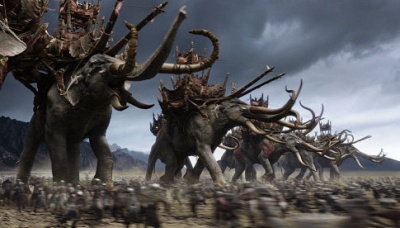
The longest of the three parts, The Return of the King weighs in at a hefty 3 hours 21 minutes (with a rumoured 4 hours 15 minutes cut planned for the special edition DVD release), but after a slow start the film whips along, and in the end seems nothing like a 3-hour plus film. In fact, you may find yourself wishing for more. That a running time of this length should have been made into such an issue, though, is indicative of the incredibly short attention span of contemporary audiences. The most popular film of all time (if you adjust box-office takings to reflect inflation) is Gone With the Wind, was 238 minutes long, and was released in 1939.
The Return of the King carries on with the stories that were begun in Fellowship - Frodo (Elijah Wood) and his gardener Sam (Sean Astin) are still travelling towards Orodruin, Mount Doom, in a quest to cast the One Ring into the fires in which was forged, destroying it utterly and forever, and preventing Middle Earth from falling into Sauron's dominion. Meanwhile, Gimli the dwarf (John Rhys-Davies), Legoland the elf (Orlando Bloom) and Aragorn the human (Viggo Mortensen) have met up with the hobbits they were chasing in The Two Towers - Pippin (Billy Boyd) and Merry (Dominic Monaghan), and are planning, along with King Theoden of people of Rohan (Bernard Hill), how best to aid Gondor and the city of Minas Tirith in its imminent battle against the hordes of Mordor.
Throughout this two of the main characters, Frodo and Aragorn, must come to terms with their destinies, and cope with the greatest challenges of their lives. Frodo must put his life in the hands of the treacherous Gollum (Andy Serkis), if he is to destroy the ring and save the world, and believe also that Gollum can be redeemed, and that his own future is not forsaken. Aragorn, meanwhile, whom we have seen mature from the shadowy ranger Strider to the regal leader of men who was the compelling factor behind the victory of the Rohirrim over Saruman's orcs at the battle of Helm's Deep, must finally accept his heritage, and become the titular king he was born to be. He then must travel the 'Paths of the Dead' and call up an army of the dead to aid him.
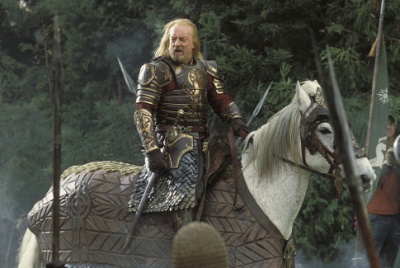
Around these two main plotlines are the action. Lots of it. Two battles, huge eagles, bigger trolls, giant elephant thingies, similarly gigantic rhino thingies (wonderfully descriptive, no?), beautiful white cities, eerily-glowing evil citadels, thousands upon thousands of men and about 4,678,342 orcs (at a conservative estimate). And nine Nazgul (ring-wraiths), mounted on dragon-like beasts that look like the product of a nuclear explosion in Jurassic Park. It's all really rather good.
Though the main action picks up where The Two Towers left off, The Return of the King starts just a little further back in time (about 500 years, in fact), and tells the story of Gollum, or Smeagol as he was known then, and how the ring's power drove him to murder the first time he laid eyes upon it. This also allows us to see Andy Serkis as he really is, albeit with pointy hobbit ears, as we follow Smeagol's transformation into the sun-fearing, wretched Gollum (though we do already see more of Serkis than you might think - all of Gollum's facial expressions are Serkis', merely digitised for the CGI character). This back story merges into the present as we discover this is a flashback for Gollum himself, who is considering his life since finding the evil little piece of jewellery.
Serkis is again superb as the pathetic almost-hobbit, and imbues the character with both incredible menace and vast pity, while the boys at Weta have ensured that Gollum continues to be the best CGI character yet seen on film, and the scene in which Gollum converses with his reflection in a puddle is a particular highlight (and let us make this absolutely clear - Gollum is NOT schizophrenic, he has a split personality, which bears no similarity to schizophrenia). If the American Academy overlook Serkis again, even for a nomination for an Oscar, and even more so overlook Jackson and The Return of the King for, respectively, Best Director and Best Picture, then the Academy will lose all respectability in the eyes of most filmgoers. The Lord of the Rings trilogy is both great entertainment and great film-making, and deserves recognition.
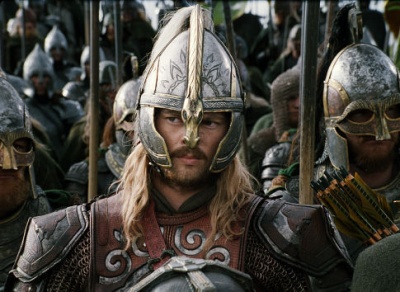
While not flawless, Return's flaws are so few and so small that it would be churlish to mention them, with the possible exception of one. The Nazgul, in Jackson's films, are presented more as Samson-like warriors, with prodigious strength and skill in battle, whereas in the books the main power of the Black Riders was their ability to strike deadly fear into the heart of their enemies, and make even the most courageous and stout warriors quail and despair, and this is not evident on screen. However, whether this would even be an issue if you hadn't read the books I cannot tell. Still, they are pretty menacing.
There are also improvements over The Two Towers - in that film there were too many instances of comedy that always felt out of place, as if the director couldn't quite commit himself to the tension of the scenes, and felt he had to deflate it before it became unbearable. Similarly tense sequences in The Return of the King are punctuated by jokes, but there are less of them, and it is a gallows humour, and as such perfectly at home. "Certainty of death, slim chance of success? What are we waiting for?" quips Gimli.
What many were expecting to be a flaw, though, is not - the well-publicised (mostly due to Lee himself, the moany old bugger) cutting of Christopher Lee's Saruman from the film is probably a good idea. At the end of The Two Towers Saruman was a defeated man, and had no more part to play in the story as it was told on screen (in truth, he plays little more part in the book until the unfilmed 'Scouring of the Shire'), and his presence and his sepulchral tones would merely have diverted attention away from the real bad guy, Sauron. Saruman was only ever a puppet of the Lord of the Rings, and there is only room for one villain in the piece.
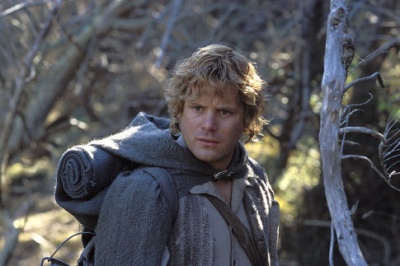
Other characters' roles are slightly different from in the book, but this is generally for dramatic imperative. Narsil, 'The Sword That Was Broken', is re-forged at Arwen's (Liv Tyler) behest, and delivered to Aragorn by Elrond (Hugo Weaving) to urge him to accept his true identity and follow his destined path to Gondor. Beyond this, and a touching scene in which Elrond resigns himself to losing his daughter forever, the elven father and daughter are not much seen. A good thing too, as they don't ever have a lot to do in the source material. But you don't resent Arwen's few appearances, though you may feel "hmm, Liv Tyler, very pretty, thank you, but now back to the fighting, please."
Most of the important themes and morals from Tolkien's text are present, most notably those of love and loss, sacrifice, courage, fear, friendship, the importance of fighting for what's right (as opposed to, say, fighting so you can keep petrol at a low price) and hope, not one of which can be a bad thing for people to be aware of. There are also important lessons in the end the sort of which don't usually appear in regular Hollywood blockbusters - the hero won't always live happily ever after, not every wound or hurt will heal. Not everything has a saccharine ending - experiences leave scars but, and this is the really important bit, that's alright.
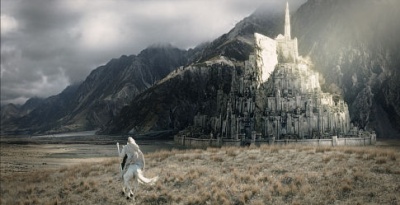
Though the first hour is paced perhaps a little too slow, Jackson has done an excellent job of putting the movie together. Not the most subtle of films, it assaults your senses at every turn, most extremely so during the battle sequences and the climax on the mountain, leaving you gasping and reeling, and all the more open for the emotional impact of the characters' plights. It also looks stunning, with Andrew Lesnie's beautiful photography mixed seamlessly with the much-vaunted 'bigiatures' and Weta's stunning visual effects, with the Gondorian city of Minas Tirith looking particularly magnificent. Howard Shore's score is also as good as the previous two, though some musical themes may, after more than nine hours of viewing, seem a little repetitive.
Given that it was all filmed together, you would expect the performances to be equally good throughout the trilogy, but some of the cast, particularly Viggo Mortensen, delivering a Henry V style speech before battle, and Sean Astin, who gives a wonderfully touching performance as the ever-dependable Sam, seem to have given their best efforts in the scenes that would end up in the final instalment. Jackson's direction also seems the most assured in The Return of the King, even allowing him to return to his horror roots for Frodo's encounter with the giant spider Shelob, and his ordeal in her lair.
If any criticism were to be levelled at Return it would be that it takes too long to end. There are at least three places in which you are sure that it will, yet it doesn't. In fact, it feels that, at the end Peter Jackson, along with Frodo, is having trouble letting go of the ring. But who can blame him? It's been his life for seven years. And, given how much pleasure I have received from watching this remarkable trilogy, I'm not entirely sure I want it to end either.
From my peaceful room in the last homely house, I award The Lord of the Rings: The Return of the King a full 5 parading badgers.
Elijah Wood (Frodo)
Sean Astin (Sam)
Andy Serkis (Gollum)
Ian McKellen (Gandalf)
John Rhys-Davies (Gimli)